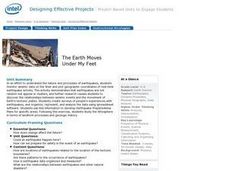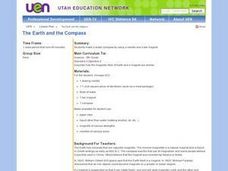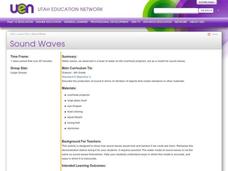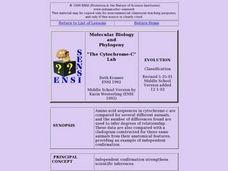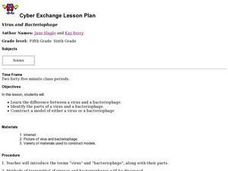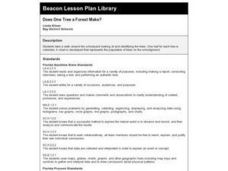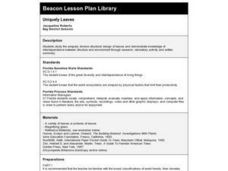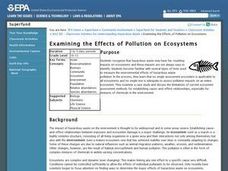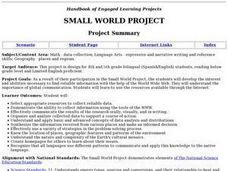Curated OER
The Earth Moves Under My Feet
Students study earthquakes, monitor seismic activity using the Web, and plot real-time activity. They examine movement of the Earth's tectonic plates. They create an earthquake preparedness project.
Curated OER
The Earth and the Compass
Fifth graders construct a water compass to investigate the effects of Earth's magnetic field and other sources of magnetism. They predict, observe and draw conclusions from their investigation.
Curated OER
Sound Waves
Students observe how sound waves would look and behave if we could see them. They determine ways the model is accurate and inaccurate based on actual sound waves.
Curated OER
Finding the Ages of Rocks and Fossils
Young scholars practice dating fossils. They learn the concept of "deep time"--that earth was formed billions of years ago. They experience excellent hand-outs and virtual age tutorial links.
Curated OER
Elevation, Plants and Animals
Students determine whether elevation is one of the things that affect where and how plants and animals live. They read plant and animal physical descriptions and determine the environment where the animal might live.
Curated OER
Turtle Lesson
Learners explore the five common turtles that are native to the eastern United States. They investigate each turtle's characteristics, environment, means of protection, eating habits, and show how they can help these turtles survive.
Curated OER
The Cytochrome-C Lab
Learners examine a method biologists use to try to determine relationships. They examine how amino acid sequences have been determined for a number of proteins, and how scientists can make inferences about DNA based on the amino acid...
Curated OER
Virus and Bacteriophage
Students examine the differences between a virus and a bacteriophage. They explore various websites, identify the parts of a virus and a bacteriophage, and construct a model of a virus or bacteriophage.
Curated OER
Classroom Cladogram of Vertebrate/Human Evolution
Learners build a Colossal Classroom Cladogram of vertebrate evolution. After putting it together, they show the gradual, mosaic accumulation of the traits which we, as humans, possess.
Curated OER
The Monarch Watch
Students collect and examine the life cycle of monarch butterflies. They also tag butterflies and release them as part of a nation-wide project to study monarch butterfly migration.
Curated OER
"Garden Springs Gardeners"
First graders ponder the question of how plants help their lives. They observe and compare properties of several different plants. Differentiate between living organisms and nonliving objects.
Curated OER
Plant Structure and Growth
This plant structure and function PowerPoint addresses the main organs and the factors that affect its development as well as going into detail about the specializations at a cellular level. The cell functions and system adaptations...
Curated OER
Does One Tree a Forest Make?
Students take a walk around the schoolyard looking at and identifying the trees. One leaf for each tree is collected. A chart is developed that represents the population of trees on the school ground. They keep journals and write an essay.
Curated OER
Uniquely Leaves
Fourth graders study the uniquely diverse structural design of leaves and demonstrate knowledge of interdependence between structure and environment through research, laboratory activity and written summary.
Curated OER
Examining the Effects of Pollution on Ecosystems
Young scholars examine the different types of tests used to measure the environmental effects of hazardous waste. They work together to determine the impact of pollution on different ecosystems. They read a case study and answer...
Curated OER
A Peek at the Past: Gradualism vs. Punctuated Equilibria
Students consider two sets of simulated fossils (caminalcules) that are provided as cutouts. They arrange them on two time scales. One set produces a visual example of gradualism, the other shows punctuated equilibria.
Curated OER
It Counts
Students assign numbers to describe objects. In this number activity, students assign numbers to objects and compare more, less, and equal values. They write down descriptions of plants including the number of leaves and height of the...
Curated OER
Side by Side: Butterfly Wings and Symmetry
Pupils observe butterfly images and then draw and paint their own design. They use this activity to explain symmetry.
Curated OER
Animals and Animal Babies
Students examine how some animal young are similar to the adult. They look at pictures of various animals and their young and identify if they look similar or not similar to the adult animal, and draw a picture of a baby and parent...
Curated OER
Hominoid Cranium Comparison
Learners describe, measure and compare cranial casts from contemporary apes (chimpanzees and gorillas, typically), modern humans and fossil "hominids" (erect and bipedal forms evolutionarily separated from apes).
Curated OER
Small World Project
Young scholars participate in the Small World Project that develops their interest and abilities necessary to find reliable information from the Internet and through global communication. They develop homepages, research topics, and...
Curated OER
Leonardo the Genius
In this artists history worksheet, students read an excerpt about Leonardo Da Vinci. They suggest what natural abilities, attitudes, and personal characteristics he would have needed to do all the famous works that he painted. Students...
Curated OER
Radial Design Mandala
Students design original radial art designs.In this radial design lesson, students use compasses and a nature inspired idea to create radial art. Students understand the use of symmetry, balance and design shapes in continual patterns....
Curated OER
Does Shape Affect Drag?
Students study drag and how it affects a parachute in the sky. In this parachutes instructional activity students build models and compare their drag.


